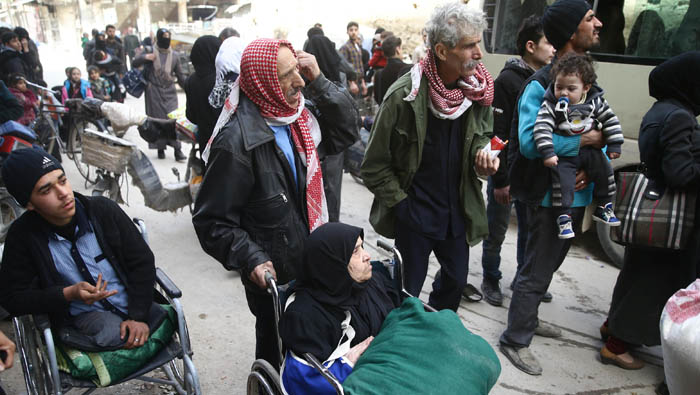
Beirut: The last rebel group fighting in Syria's eastern Ghouta said on Monday it was still trying to negotiate an end to the army's assault, dismissing a Russian report that it was ready to leave the stronghold near Damascus.
All other insurgent groups there have agreed to surrender their territory in deals mediated by the government's ally Moscow, bringing President Bashar Al Assad to the cusp of his biggest victory over the rebels in more than a year. But the Jaish Al Islam group has kept hold of the town of Douma.
"The negotiations are still ongoing without reaching a final agreement till this moment," Mohammed Alloush, a senior official from the group, said in a text message to Reuters.
A Russian officer earlier said on Monday the group had signalled during talks it was ready to lay down its arms.
"(This) is a lie and devoid of truth," Alloush said.
"An attempt to insist on forced displacement will be catastrophic," he added.
The group's fighters skirmished with the Syrian army on one front of the Douma pocket on Monday, said the Syrian Observatory for Human Rights, a Britain-based war monitoring group.
The army fired shells into the town, it added.
Under the Russian deals, scores of buses have left the area since Thursday carrying fighters from other rebel groups, their families and civilians who do not want to come back under Assad's rule, to opposition areas in northwestern Syria.
On Monday, a long line of buses stood waiting at a road junction, waiting to take thousands more people north.
They were leaving the towns of Arbin, Zamalka, Ein Terma and Jobar after the Failaq Al Rahman group which held the area agreed a surrender deal on Friday.
More than 40 buses had filled with evacuees by Monday afternoon, after scores had left from there and from a separate enclave in the town of Harasta, where rebels accepted a deal on Thursday.
Footage on state television on Monday showed four small children looking from the window of one bus as it prepared to depart, and another driving past an immense billboard depicting Assad's father, who ruled Syria from 1971-2000.
Pro-opposition Orient television showed an earlier convoy that had arrived in Idlib from eastern Ghouta.
People clambered off buses, lifting small children and large sacks of belongings.
A militant with a rifle slung over his shoulder stood nearby.
Russia has promised the rebels will be safe, but insurgent groups have said they do not trust Moscow to protect them.
Syria's government has won a string of victories since Russia entered the war on his side in 2015, often using siege and bombardment to force rebels to surrender.
A full conquest of eastern Ghouta would be Assad's biggest win since driving rebels from Aleppo in December 2016, though insurgents remain entrenched in areas of northwestern and southwestern Syria.
Western countries and rights groups have accused Damascus and Moscow of indiscriminate bombardment, including the targeting of civilian infrastructure and the use of barrel bombs, chlorine gas and incendiary explosives.
They deny that and say their offensives, including the one against eastern Ghouta which started on February 18 with a crushing bombardment, are necessary to free civilians from the rule of extremist militants and end mortar attacks on government areas.